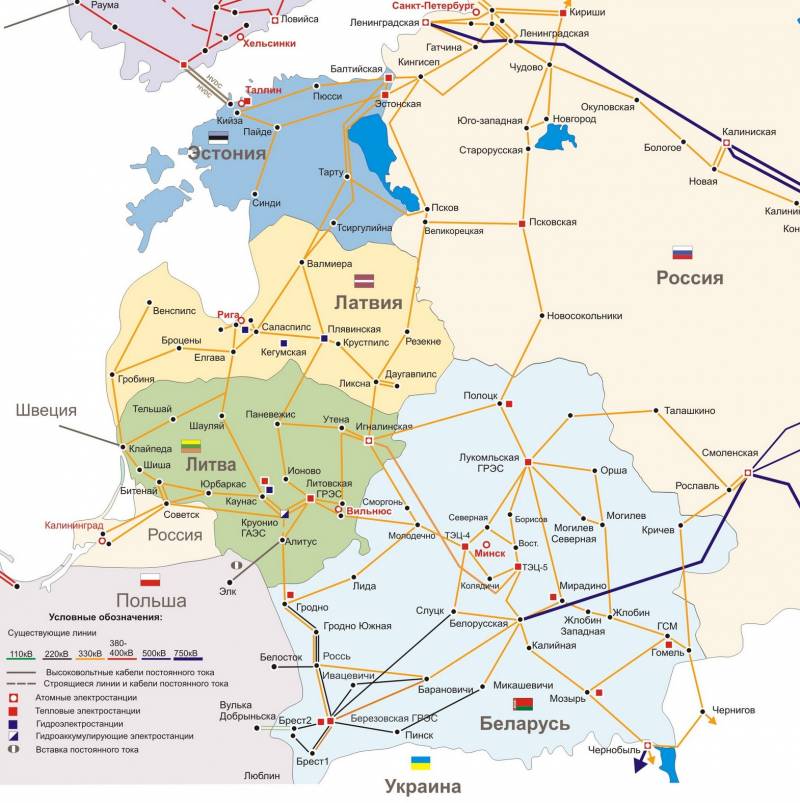What comes out of the Baltic exit from BRELL
The Baltic states are tearing off recent ties with Russia. In June next year, three former Soviet republics in test mode will try to get out of the unified energy ring BRELL, which they join together with our country and Belarus. Why is Riga, Tallinn and Vilnius taking this step, despite the fact that it will cost them dearly? Very expensive.
BRELL is a unified energy system named after the first letters of the countries included in it. It was created in 2001, and the former Soviet republics entered it because of the obvious profitability. Tallinn, Vilnius and Riga began to purchase relatively inexpensive electricity in Russia and Belarus, and Moscow was able to provide Kaliningrad, which was territorially divorced from the main Russian territory, with energy supply. Thanks to the enlargement of the power system, it became possible to smooth out peaks and dips in electricity consumption, caused, inter alia, by the difference in time zones. So why then did the Baltic countries need to leave BRELL?
The solution is on the part of the Baltic elites politicalThey declare the need to get rid of dependence on the Russian Federation. At the same time, the price of the issue for the end consumer, as well as the emergence of dependence on senior partners in the European Union, are left out of brackets.
The fact is that de facto today the three republics constitute a certain “island” with respect to the European energy system, weakly connected with it and having a serious deficit of its own generation. Moreover, this deficit appeared due to the demands of the Europeans themselves. So in 2009, Lithuania was forced to close the “wrong” Ingalinsk NPP, which was built back in the USSR. In exchange, the construction of the “correct” Visagin nuclear power plant, as well as other compensating capacities, was promised. But promising does not mean making. Adequate funding by European officials has not been allocated so. Brussels does not hide the fact that since 2020 it plans to cut its subsidies to the “Young Europeans” at all.
So what can the Baltic States get after leaving BRELL, and what will it cost it?
In 2004, it was decided to "hang" the Baltic "island" on the NordBalt cable, stretched from Sweden to Lithuania. From a technological point of view, this cable is able to give a certain diversification of energy consumption. But this is in theory, but in practice the Baltic states were suspended on a thin “thread” that breaks all the time. In order not to be unfounded, we give the numbers. Due to the need for repairs, in 2016 NordBalt was shut down 16 times, the next year accidents and unavoidable shutdowns occurred almost every month, and in the current 2018, the downtime amounted to all six months. The transition to dependence on such a power source looks like a real gamble with an inevitable sad outcome. By the way, the cost of NordBalt amounted to more than half a billion euros.
Let's move on to even more impressive figures that will make any Baltic tear. The exit price from BRELL is tentatively estimated at between 800 and 900 million euros. The budget for a reliable connection between the “island” and Europe ranges from 2 to 3 billion euros. For the not-so-rich Baltic States, the amount is colossal. It is not worth counting on helping European friends, as has already been said, in a few years the subsidies will be reduced by 40%. The transfer of the burden of “European integration” onto the shoulders of end consumers will be absolutely inevitable.
And again the numbers. Today, Lithuanians pay 0,11 euros for “wrong” Russian and Belarusian electrons, Estonians pay 0,13, and Latvians pay 0,16 euros per kilowatt per hour. By the standards of Europe, these are scanty amounts, and cheap electricity, like any relic of the “scoop,” must be destroyed. Thus, electricity is supplied to the Swedes at a price of 0,2 euros, and Danes and Germans - 0,3 euros per kilowatt. It is precisely these figures that residents of the Baltic states should be guided in the very foreseeable future after leaving BRELL.
BRELL is a unified energy system named after the first letters of the countries included in it. It was created in 2001, and the former Soviet republics entered it because of the obvious profitability. Tallinn, Vilnius and Riga began to purchase relatively inexpensive electricity in Russia and Belarus, and Moscow was able to provide Kaliningrad, which was territorially divorced from the main Russian territory, with energy supply. Thanks to the enlargement of the power system, it became possible to smooth out peaks and dips in electricity consumption, caused, inter alia, by the difference in time zones. So why then did the Baltic countries need to leave BRELL?
The solution is on the part of the Baltic elites politicalThey declare the need to get rid of dependence on the Russian Federation. At the same time, the price of the issue for the end consumer, as well as the emergence of dependence on senior partners in the European Union, are left out of brackets.
The fact is that de facto today the three republics constitute a certain “island” with respect to the European energy system, weakly connected with it and having a serious deficit of its own generation. Moreover, this deficit appeared due to the demands of the Europeans themselves. So in 2009, Lithuania was forced to close the “wrong” Ingalinsk NPP, which was built back in the USSR. In exchange, the construction of the “correct” Visagin nuclear power plant, as well as other compensating capacities, was promised. But promising does not mean making. Adequate funding by European officials has not been allocated so. Brussels does not hide the fact that since 2020 it plans to cut its subsidies to the “Young Europeans” at all.
So what can the Baltic States get after leaving BRELL, and what will it cost it?
In 2004, it was decided to "hang" the Baltic "island" on the NordBalt cable, stretched from Sweden to Lithuania. From a technological point of view, this cable is able to give a certain diversification of energy consumption. But this is in theory, but in practice the Baltic states were suspended on a thin “thread” that breaks all the time. In order not to be unfounded, we give the numbers. Due to the need for repairs, in 2016 NordBalt was shut down 16 times, the next year accidents and unavoidable shutdowns occurred almost every month, and in the current 2018, the downtime amounted to all six months. The transition to dependence on such a power source looks like a real gamble with an inevitable sad outcome. By the way, the cost of NordBalt amounted to more than half a billion euros.
Let's move on to even more impressive figures that will make any Baltic tear. The exit price from BRELL is tentatively estimated at between 800 and 900 million euros. The budget for a reliable connection between the “island” and Europe ranges from 2 to 3 billion euros. For the not-so-rich Baltic States, the amount is colossal. It is not worth counting on helping European friends, as has already been said, in a few years the subsidies will be reduced by 40%. The transfer of the burden of “European integration” onto the shoulders of end consumers will be absolutely inevitable.
And again the numbers. Today, Lithuanians pay 0,11 euros for “wrong” Russian and Belarusian electrons, Estonians pay 0,13, and Latvians pay 0,16 euros per kilowatt per hour. By the standards of Europe, these are scanty amounts, and cheap electricity, like any relic of the “scoop,” must be destroyed. Thus, electricity is supplied to the Swedes at a price of 0,2 euros, and Danes and Germans - 0,3 euros per kilowatt. It is precisely these figures that residents of the Baltic states should be guided in the very foreseeable future after leaving BRELL.
- Sergey Marzhetsky
- http://geoenergetics.ru/


Information